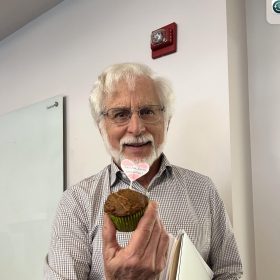Sander Goldberg

As UCLA Distinguished Research Professor, Sander Goldberg continues to explore the relationship of Roman literature to Roman life. A new edition of the pioneering Republican poet Ennius for the Loeb series, prepared in partnership with Gesine Manuwald of University College London, appeared in 2018, a monograph on Terence’s Andria for Bloomsbury appeared in 2019, and a Cambridge Green and Yellow commentary on Andria in 2022. Forthcoming work includes chapters in two books from Cambridge, one on epic diction for a volume on early Latin edited by Jim Adams, Anna Chahoud, and Giuseppe Pezzini, and the second on the role of fragmentary texts in literary history for a volume entitled Writing Literary History in the Greek and Roman World, edited by Henry Spellman and Giacomo Fedeli. Current projects include chapters on stage performance and related genres from the (Greek) fourth century to the (Roman) first century for a new Oxford history of classical literature and an inquiry into the adventurous life and pathetic death of Usher Gahagan (ca. 1713-1749), the only editor of Latin texts ever hanged at Tyburn.
The UCLA classroom has not entirely lost its allure, however. Sander continues to teach graduate and undergraduate classes in Latin as needed and is always available to advise students interested in pursuing topics related to Roman literature of the Republic and the legacy of that literature.
Projects
Performing Cicero
Roman oratory was a living art. Orators knew that the persuasive power of a speech did not come from the force and clarity of its argument alone. A speaker needed not simply to be heard distinctly, but to project the kind of confident, engaging personality that could win an audience’s good will and command its belief. Rhetorical training therefore included practice in those aspects of voice and gesture that made orators into effective performers.
This site records a series of experiments in the performance of a Ciceronian speech. The goal was less to recreate an ‘authentic’ performance than to identify some parameters of Roman oratory by considering the demands on voice, gesture, dress, and bearing that delivery under ancient conditions imposed.
http://performingcicero.classics.ucla.edu/
The (Digital) Oxford Classical Dictionary (aka OCD5)
Since it first appeared in 1949, the Oxford Classical Dictionary went through four editions, always expanding but always true to its original aim of providing “an authoritative one-volume guide to all aspects of the ancient world.” No small task. And no small volume! It took OCD1 990 pages to do the job. By 2012, OCD4 needed nearly 1,650 as its editors strained to keep pace with both the increase in knowledge and (an even greater challenge) with the changing interests, approaches, and interpretations that give our field its distinctive vibrancy. And even then, reviewers were beginning to notice that what had always been a difficult task was becoming impossible. Keeping up to date with facts, bibliographies, and trends was hard enough. Representing without maps and illustrations a field that increasingly blends text-based, historically-based, and material-based lines of inquiry was even harder, not to mention expanding the volume’s coverage to reflect the broadening chronological and geographic range of those interested in what was once more narrowly defined as “classical studies.”
The obvious escape from such limitations was to go digital, which meant not a digital version of a printed resource but a new kind of research tool specifically designed to put modern technical capabilities at the service of modern scholarly needs. In 2013 Sander assumed responsibility for making that transition and guided the OCD into that new era, defining new areas of interest, new editorial procedures, and new standards of coverage. Now under the editorial guidance of Tim Whitmarsh, OCD5 contains over 6,500 entries expanded and updated monthly, fully illustrated and linked to a wealth of additional online resources.
OCD5 is accessible through an institutional membership or an individual subscription. The UCLA community can access it directly on campus or off-campus using the UCLA VPN at https://oxfordre.com/classics.

